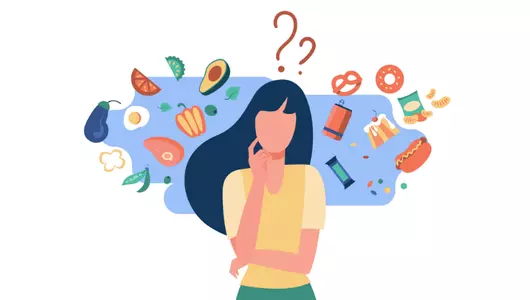
The real reason why I don't comment on your weight

Yes, I see that you've lost weight. I actually noticed right away. And I want to be happy for you, really I do. I will listen quietly as you proudly share that your new diet has improved your energy level and your self-esteem. Or how much better you feel after cutting out this food or that. I will wince internally as you tell me how much money you're spending on the supplements you're now taking, the foods you're eating and your new gym membership. I know you feel great and you just want to shout it from the rooftops. You want everyone to feel as good as you do right now. I get it. I really do.
But the thing is, in a few short months—or maybe a year—we'll see each other again, only this time you'll be struggling. Depressed. One birthday-cake-eating-food misstep, and you were sent into a spiral of bingeing that you couldn't stop. Repulsed by the inability to "stick with it," you tried to start the diet back up again. But it just wouldn't work. Headaches, fatigue and stress reappeared. Previously lost weight found its way back and more. Miserable, you resolve to start again and spurt and sputter your way through the next diet only to fail once more. You give up. Ashamed. You avoid making eye contact with me, too embarrassed to ask for my help, not sure if you even want to hear what I may have to say.
As a dietitian working in weight-management, the challenge my patients face in developing and maintaining a positive relationship with food is seen firsthand. Dieting is revered in our culture. And successful dieting–losing weight–is seen as the holy grail. The thing is, diets are designed to fail: the diet industry's whole business model is built on making a swift profit and creating repeat customers–the diet trap. In fact, your success (losing weight and managing to keep it off) with their diet plan is their failure. Too many people fall into the diet trap and can't get out. The thrill of potential success taints the ability to see the end game.
And the worst part? Dieting has serious biological and psychological side effects. Dieting increases one's risk of heart disease and premature death. Dieters have greater body fat retention after the diet period ends, a decreased metabolic rate over time and experience increased food cravings and binge eating events. In fact, one in four dieters will develop an eating disorder!
So, please don't take offense to my lack of recognition. It's not because I don't see your weight loss, and it's not because I'm not happy that you're happy. I am. I know how hard you worked to get where you are. It's just that implementing new lifestyle skills is hard work and painstakingly slow. The desire to abandon the uncomfortable newness of living a healthy lifestyle for the familiarity of dieting is so strong that most relapse back into dieting several times before they finally break away for good.
Living a healthy lifestyle is the opposite of a diet. It takes time and consistency. It requires ongoing help from skilled and experienced nutrition professionals who teach non-diet weight management. The reason I don't comment on weight is because a full and healthy lifestyle is so much more than the number on the scale or the clothing size you wear, and that is far more worthy of my (and your) attention.
Related articles

Protein takeover: How much is really needed per day?

What exercise burns the most calories?

The link between nutrition and your mental health

How much fiber does my child need?